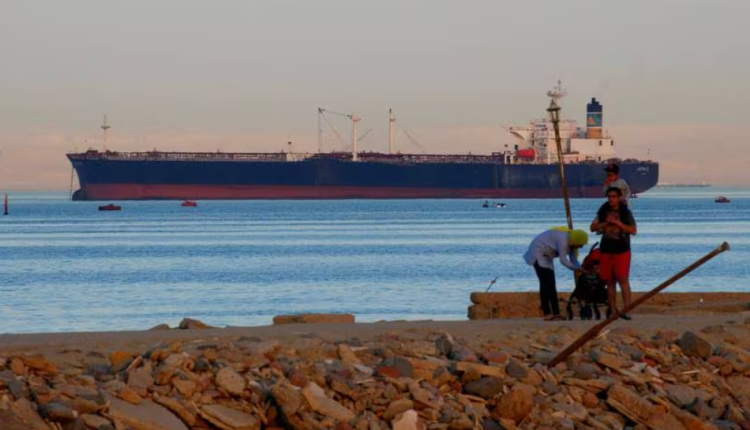Red Sea disruption threatens the Middle East’s apple a day
Leading figures in the fruit sector say the Red Sea crisis has already hit sales of apples to the Middle East from Europe, as experts predict disruption to the food industry to spread out across the export trade, writes SEEDS.
The market for European apples in Saudi Arabia and the UAE alone is estimated to be worth in the region of $400 million, but it has now been affected by Houthi rebel attacks on ships.
“Apple exports from Ukraine, Moldova and Poland have been impacted the most since the UAE and the Middle East region in general, as well as Asia and sub-Saharan Africa, are important markets,” Kateryna Zvierieva, project manager at the fresh produce monitoring company EastFruit, told The National.
‘The longer it goes on, the more difficult it is to unwind’
European farmers took to the streets this week, warning that a perfect storm of wars, taxes and regulations was making their products uncompetitive, writes the publication The National.
The disruption caused by the protests has contributed to a drop in export volumes, as some produce hasn’t even made it to ports, said Marco Forgione, director general at the UK-based body, the Institute of Export & International Trade.
“The shifting of the supply chain isn’t something that’s done at the flick of a switch. But equally, putting it right isn’t done with a flick of a switch either,” he told The National.
“The longer it goes on, the more difficult it is to unwind, even once the immediate problems in the Red Sea are resolved.”
By some calculations, 150 fewer vessels went through the Suez Canal in January this year compared to the same month in 2023, which represents about five million tonnes of cargo that has either not left its source at all or has been rerouted around the southern tip of Africa.
That major flow in global trade and the resulting effects on supply chains was illustrated when the electric car maker Tesla announced it would have to close its factory in Berlin for two weeks in late January and early February because of a shortage of components made in Asia.
Likewise, production at a Suzuki factory in Hungary stopped for a week recently, because of a delay in getting engines and other parts from Japan.
The British retail chain Marks & Spencer warned that the attacks in the Red Sea would delay new spring clothing and home goods collections that were due in February and March.
:quality(70)/cloudfront-eu-central-1.images.arcpublishing.com/thenational/L6ZWMX6XVRHSNCXASOXPWQGHXI.png)
But there is also a significant trade in European fresh produce that under normal circumstances passes through the Suez Canal and the Red Sea on its way to markets in the Gulf and further east in Asia.
Those perishable consignments are at risk of rotting if they have to spend an extra two weeks at sea, going around the southern tip of Africa, avoiding the Red Sea and Gulf of Aden but notching up an extra 3,500 nautical miles.
Southern European and north African fruit and vegetable exporters around the Mediterranean are particularly at risk.
“For the agri-food sector, in fact, there is the issue of the shelf life of fresh products, which does not allow the journey to be extended by 15-20 days,” Cristian Maretti, the president of the Italian agricultural co-operative, Legacoop Agroalimentare, told Italy’s Ansa press agency.
“Fortunately this [Red Sea] problem arose after important products, such as kiwis, had already been harvested, while for apples we are still halfway through.
“Naturally, in a sector dominated by the seasonal nature of production, the damage will depend on the duration of the blockade.”
:quality(70)/cloudfront-eu-central-1.images.arcpublishing.com/thenational/73E53QFZXNGURAQEMOZ6ASVAEU.jpg)
Core issue
Time has been on the side of some European fruit growers so far. Kiwis, figs and grapes that usually find their ways to Gulf and Asian dining tables were harvested and shipped in autumn, before the Houthis began their attacks.
Moldova is an interesting example. Since early December, the eastern European country’s apples have been subject to a complete ban that Russia has levied on all Moldovan fruit and vegetables.
With the loss of its large Russian market, Moldova has been looking to redirect more of its crop to the EU (via its neighbour, Romania) and the Middle East.
Before the start of the Houthi attacks in the Red Sea in late November, this would have been relatively simple.
Now, the choice is to risk running the gauntlet of missile attacks in the Red Sea and the Gulf of Aden, or risk shipments of fresh apples going off in transit around the Cape of Good Hope.
Technically, this will make crops such as apples cheaper in domestic markets and more expensive in those countries that are importing them.
“In most cases the price adjustment will occur – lower prices in the exporting countries to boost local consumption and higher prices at the importing countries to cover part of the extra costs in shipping,” – Ms Zvierieva told The National.
Having agricultural produce that would normally be exported dumped on markets within the EU will cause prices of some products to fall dramatically, said Mr Maretti.
“If the products are not exported, the risk is that of flooding the Italian and European markets with dramatic effects on prices, which will undoubtedly collapse.
“2024 opened with a new big problem for our cooperatives, when we are not yet completely out of all the previous ones,” he added.
:quality(70)/cloudfront-eu-central-1.images.arcpublishing.com/thenational/METGUV2LUREK5LAYL5VGINK4NI.jpg)
Egyptian citrus
Another troubled and concerned sector is Egyptian oranges. The country is the world’s largest exporter of citrus fruit, with oranges making up about 85 per cent of the total, as growers favour oranges due to the higher demand and prices the fruit commands.
Egypt’s citrus exports grew 21 per cent in 2023 to 1.7 million tonnes, valued at $985 million.
US Department of Agriculture figures show that Egypt’s orange exports reached 126 countries in 2022-23, compared to 104 countries in the previous year.
The Netherlands, Russia, Saudi Arabia, India, UAE, Spain, Bangladesh, Syria, China and UK were Egypt’s top 10 export destinations for oranges.
With the Houthi attacks in the Red Sea, some orange producers opted to send their exports to the Middle East and Asia out of the western end of the Mediterranean and around Africa.
Sending more oranges to Europe isn’t a viable short-term solution, merely because demand for citrus in the EU is fairly constant and later in the year the orange crops in Spain will start to feed into the market.
“Egypt will keep exporting through a longer route, but it will come at some cost to growers. Also, the price to consumers will go up, compensating for part of the extra shipping costs,” Ms Zvierieva, at EastFruit told The National.
“Sending more to Europe is going to be difficult considering its stable consumption.”
East African exports
Countries in East Africa are facing similar dilemmas in sending their fresh fruit and vegetables to markets in Europe.
Kenya is the world’s largest exporter of black tea and, while much of it comes to the EU and the UK, Pakistan has recently become its largest market.
Nonetheless, 21 per cent of all Kenyan exports are destined for Europe, and the quickest route is up the east coat of Africa to the Red Sea, through the Suez Canal and in the Mediterranean Sea, a passage that now carries added risk thanks to the Houthi attacks.
If exports from East Africa have to be shipped through the Cape of Good Hope, the trip can be four times as long – 48 days, as compared to 12 via the Suez Canal.
Depending on the shipping company and the type of cargo, rates have risen 70-100 per cent, a cost that will be could be largely passed on to consumers in Europe.
Some agricultural products are not affected though. For example, 70 per cent of Kenya’s green bean exports come to the UK, and of those 90 per cent are delivered by air, because of their high perishability.
On the other hand, Kenya imports European products that have incurred increased shipping costs because they have been shipped through the Cape of Good Hope, including agricultural equipment and fertilisers.
:quality(70)/cloudfront-eu-central-1.images.arcpublishing.com/thenational/P4OQ222NLLVWTNOAPJLVFOCUEM.jpg)
Other supply chain issues, aside from the attacks in the Red Sea, are also affecting the trade in agricultural products from Europe to Asia, not least the farmers’ protests that have simmered in the EU for some months and have recently culminated in a road blockade of Paris and eggs being thrown at the European parliament in Brussels.
The trouble is, the longer the Red Sea attacks continue, the deeper and more complex the problem becomes for those wishing to export fruit and vegetables from Europe and North Africa to Asia, analysts say.
Exporters are seeking new markets in Central Asia and South America but, like the great container ships themselves, that change of direction takes time. There has also been a rise in interest in both air freight and land-based road and rail transport options.
Nonetheless, the longer the Houthi attacks go on, the more complicated the supply chain issues become.
“The problem starts and then it escalates in its severity over time,” Mr Forgione told The National.
Головні новини Seeds та агроідеї для зростання вашого бізнесу в Telegram Facebook Instagram
Youtube та Підписуйтесь!



